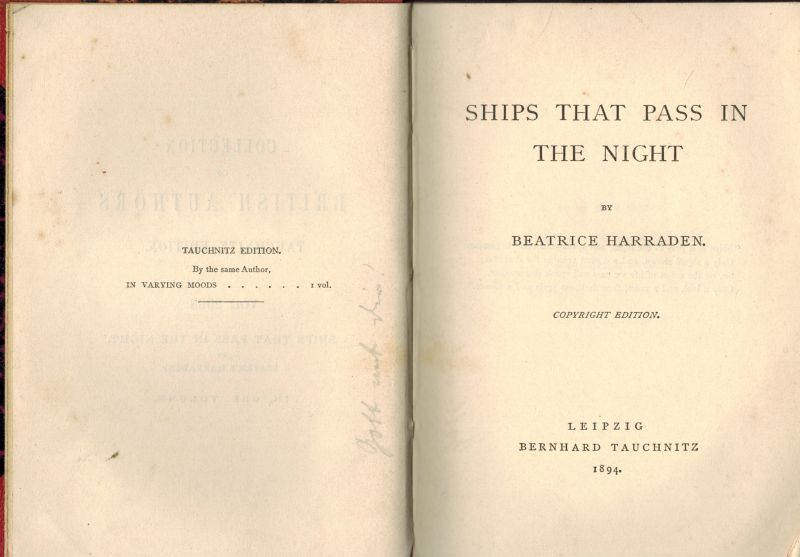Harraden, Ships that Pass in the Night.
Ships that Pass in the Night.
Copyright Edition. Leipzig, Bernhard Tauchnitz, 1894. 11 cm x 16 cm. 263 pages. Original Hardcover. Very good condition with only very minor signs of external wear. [Collection of British Authors, Tauchnitz Edition. vol. 2968].
Beatrice Harraden (1864–1936) was a British writer and suffragette. Born in Hampstead, London on 24 January 1864, to parents Samuel Harraden and Rosalie Lindstedt Harraden, Beatrice Harraden grew up to become an influential feminist writer and suffragette. She studied at Cheltenham Ladies’ College in Gloucestershire, as well as at Queen’s College and Bedford College in London. In 1883, she received her BA degree as well as an honours degree in Classics and Mathematics, which would have been a noteworthy feat for a woman in this era.
Harraden was both a leader of the suffragette movement and a founding member of the Women’s Social and Political Union (WSPU), befriending new members like Helen Craggs, and she was also an integral member of the Women Writers’ Suffrage League and Women’s Tax Resistance League.
Unlike the WSPU, who only welcomed women as members, the Women Writers Suffrage League welcomed men, women and members from diverse political parties. The only dictate for membership to the Writer’s League, other than having been paid for a literary work, was support of the suffragette cause. These writers were agitators demanding access to the male dominated civic and social institutions, but they used their pens to influence society’s social scene and the theatre. Harraden therefore turned to this group as the WSPU became increasingly militant and exclusive.
She published her work in the suffragette paper Votes for Women and travelled extensively in Europe and the United States due to her involvement in the women’s movement. This included Holiday Campaigns in the Lake District for Liverpool WSPU organiser Alice Davies, which she took part in with the Australian suffragette Vida Goldstein. She also involved herself as a reader for the Oxford English Dictionary, and this, too is reflected in her fiction: The Scholar’s Daughter (1906) is set among lexicographers.
Harraden spent several summer holidays lodging at The Green Dragon inn at Little Stretton, Shropshire, walking and writing. Her memories of this and the landlady, a Mrs Benbow, led to her writing a short story, At the Green Dragon, published in 1894.
Her early works include Little Rosebud: Or, Things Will Take a Turn (1891), as well as Ships That Pass in the Night (1893), a best-seller which sold over one million copies. The love story set in a tuberculosis sanatorium, follows protagonist, Bernadine, an independent teacher, writer and activist, who falls in love with Robert, the Disagreeable man. After recovering and leaving the sanatorium, Bernadine returns to England. The popular novel ends rather tragically with Bernadine dying suddenly in a traffic accident. Though Harraden continued her career as a writer, she failed to achieve similar success with subsequent books which included novels, short stories and books for children. In 1930, she received a Civil List pension for her literary work. She died at Barton-on-Sea on Monday 5 May 1936 aged 72. (Wikipedia)
″There is a wealth of philosophy, humor, and pathos in this little tale, and it is told so simply that one feels as if he were a part of it, somehow. So truly are the human heartstrings struck that he must be beyond redemption whose inner self does not vibrate in sympathy many times as the pages are turned….There is not a dull page….It is one book in ten thousand; you should read it.” –(Source: Boston Times)
- Keywords: Catalogue No.10 – International Literature · Catalogue Three – Literature by Women · English Literature – Rare · Literature – Rare · Literature by Women Writers – 19th Century · Literature by Women Writers – 20th Century · New Arrivals · Suffrage · Suffragette · Women and Literature
- Language: English
- Inventory Number: 44514AB
EUR 275,--
© 2025 Inanna Rare Books Ltd. | Powered by HESCOM-Software











